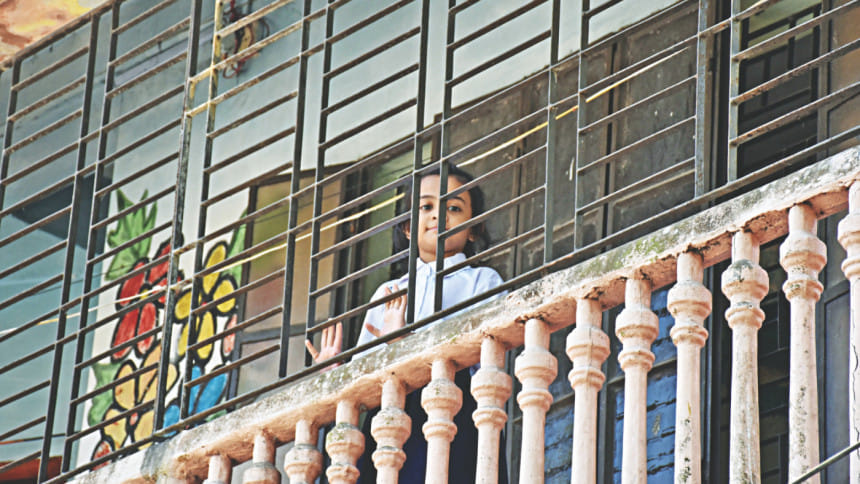For their childhoods

Growing up in a joint family had its perks. For example, there was hardly a chance to get bored. On the rare occasion I did get bored, I vividly remember my mother threatening to make me memorise my time-tables if I complained. It was a much dreaded punishment. It makes me wonder how the children are coping in this pandemic.
On one hand, this may be a golden time for many as they get to spend time with their usually busy parents. On the other, staying at home may not be a pleasant experience for many. For the children in the latter group, school was perhaps an escape. Reality has forced us to realise that there is so much variation when it comes to helping children. The calculations are far more difficult because there is so much to consider across different factors. Any policy that affects children and their childhoods should be designed and implemented with the most special care.
This pandemic is especially revealing in terms of the existing inequality among children from different socioeconomic backgrounds and different schooling streams. For example, while many Dhaka-based English medium schools are able to pursue online classes for their students, thousands of Bangla medium schools and madrasas remain closed all over the country. The problems differ in the case of children from these different spectrums. Internet access without supervision is a serious issue in the case of children going online to attend their classes.
On the other hand, the probability of falling behind in the race is perhaps the biggest worry for parents of children who are in a stream where they'll have to go through primary school certificate (PSC), junior school certificate (JSC), secondary school certificate (SSC) and higher secondary certificate (HSC) exams. I'm more concerned about the latter. I believe this is one of the rare opportunities for us to take a stand that is justified and will have little or no room for challenges. The stand is simple: cancel all these exams throughout a child's school life. What is the efficacy of all these exams? Is this really the best way to make children learn?
The pressure we put on our children in today's education system is alarming. It raises the question of whether children actually have their childhoods anymore. Someday, this may backfire dangerously. For children, even the little things matter tenfold more than in the case of an adult. The way we give children their marks and grades in front of all their classmates, the way we ask them to compete with each other in the rat-race, the way we make them feel that their value lies in the proof of their brilliance, all these things—however little they may seem to many—affect our children's personalities and mental health. As this pandemic unfolds, it is time for us to take the opportunity to rethink the education we are giving our children.
If there's anything that Covid-19 has taught us, it is that empathy should not be taken for granted. It should be the highest valued quality really, and it should be celebrated. This is why I am a strong proponent of including active participation in social work into the curriculum of children in schools and colleges. Be it planting a tree, helping out in a nursing home, feeding the poor or helping underprivileged children learn—any form of social work may help us in emphasising to our children that empathy is a priceless virtue. Gone are the days when we can rely on ethics and empathy being an automatic outcome of an institutional education. The time has come for us to actively include ethics education and empathy lessons in our children's everyday studies. It is as important as learning maths or language really. This reminds me of a conversation I once has with my aunt about the importance of teaching children our culture through our subcontinent's history and literature. She said, and I quote, "E=MC2 doesn't develop personality, but a story by Sarat Chandra does." Teaching empathy may be more important than ever for the world to come—a world where we may no longer be encouraging our children to give hugs or kisses.
I would expect our approaches and solutions to education reforms, in this pandemic, to be different for each levels of schools, college and university. As we try to achieve quality in education, we must acknowledge the much needed reform that our system of assessment needs. We have got to question traditional methods such as exams and investigate whether they are effective anymore. If we find something has become ineffective, we must research and build proper, sustainable alternatives. For example, cancelling exams like PSC and JSC throughout school life is a good strategy but its success largely depends on what alternate assessment system we put into place. There is the matter of preparing our teachers, institutions, textbooks and curriculum for the alternate assessment system. If there are lackings in this preparation, soon enough something harmful like corruption might crawl into it as well.
We have got to start doing our homework about how to reform our education system. Other countries are well ahead of us. Although contexts may be different, there is much to learn from the leading education systems of the world. Every three years, the Organisation for Economic Co-operation and Development (OECD) evaluates worldwide education systems by testing the comparative science, reading and mathematics proficiency of 15-year-old students.
Despite Singapore topping this assessment and setting the standard of success in 2016, the country has since then been rethinking its approach to education and adapting it according to the needs of the future. Their decision is that children in Singapore will no longer be ranked by exam results. Instead, Singapore will focus on creating more rounded individuals with goals to foster social development, raise self-awareness and build decision-making skills. "Learning is not a competition" is one of the premises of this shift, which aims to discourage comparisons between student performance and instead encourages students to concentrate on their own learning development.
In Finland—another highly acclaimed education system—there are no mandated standardised tests except for the one exam at the end of high school. There are no rankings, and no comparisons or competition between students, schools or regions. The belief there is that "If you only measure the statistics, you miss the human aspect."
In Japan, one of the prevalent problems in the education system has become "Futoko", which is the phenomenon of children simply refusing to go to school. Imagine our children feeling the same way, and worse still—not being able to express their feelings. God forbid that student suicides keep increasing in number. Our assessment system in our educational institutions is an indicator of what we value as a society. We must shift our focus to designing a system that fosters what really matters in building human capital, or in building good human beings. First, we must convince ourselves what really matters. If we were to assign the highest value to humanity and teach our children that "Greatness should depend on humanity, not brilliance", can you imagine how different our society could be?
Rubaiya Murshed is Lecturer at the Department of Economics, University of Dhaka.

 For all latest news, follow The Daily Star's Google News channel.
For all latest news, follow The Daily Star's Google News channel. 



Comments